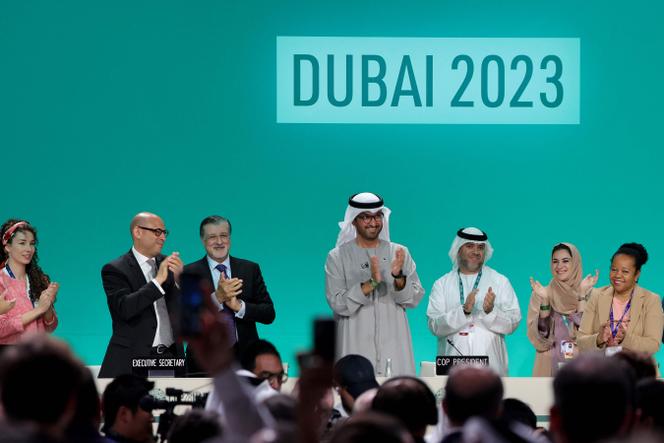


Just minutes after the start of a plenary meeting that had been postponed several times, Sultan al-Jaber, the president of the 28th Conference of the Parties on Climate Change (COP28), sealed an agreement on the Global Stocktake, the most important text of the conference. It was a swift procedure after days of hesitation and tension. The review of the 2015 Paris Agreement, intended to raise governments' ambitions, inscribes strong words against fossil fuels, which are responsible for 80% of global warming. It's a "historic decision to accelerate climate action," said al-Jaber after a standing ovation from the room.
It took a sleepless night to find terms that would be accepted by delegations from all over the world. On Tuesday, December 12, the official last day of COP28, al-Jaber lost his bet to finish on time. At the conference in Dubai, there was little belief. There was too much pressure, too much at stake and too much resistance hovered between the national pavilions. For the first time in the history of climate diplomacy, a United Nations conference had taken up a taboo subject: fossil fuels. The Emirati leader kept postponing the publication of the final version of the text, consulting throughout the night with the United States, the European Union (EU), countries like Bangladesh, and especially Saudi Arabia's energy minister, Prince Abdulaziz bin Salman, who arrived after midnight. The night's work was essential to prepare the ground for the final day of plenary meetings.
In search of a compromise between the parties most in favor of a phase-out of fossil fuels (the EU, representatives of small islands, and many Latin American countries) and oil-producing countries clinging to their economic model, al-Jaber offered a different solution. In the energy package of the latest version of the text, he wrote of "transitioning away from fossil fuels in energy systems, in a just, orderly and equitable manner," without specifying a date.
This semantic and diplomatic creativity makes it possible to dispense with the term "phase-out" – which ruffled the feathers of the Gulf states – while at the same time trying to hang on to the most ambitious climate goals. The goal of achieving carbon neutrality by 2050 is reiterated in the text. The compromise is also a way of getting developing and emerging countries on boardn, because the evolution must take place in a "just, orderly and equitable manner" – in other words, at a different pace for each economy.
You have 75% of this article left to read. The rest is for subscribers only.
